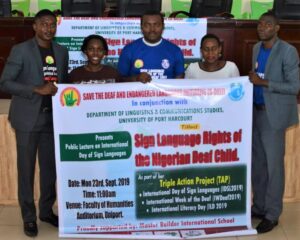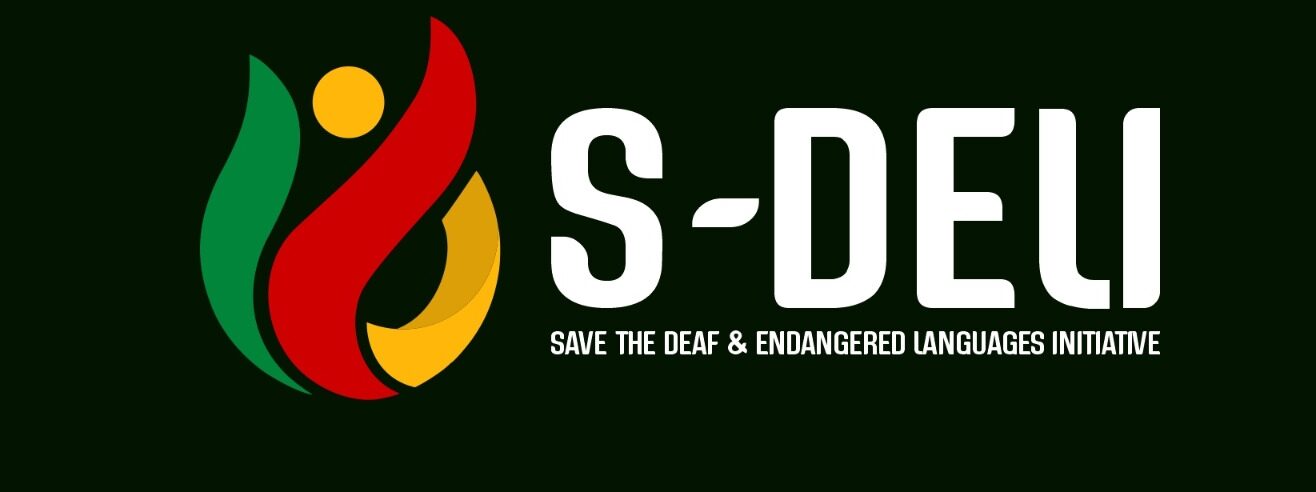By Sadiku Olubusayo
The month of September is a very special month for the deaf community. Around the world, the International Week of the Deaf is celebrated annually in the last week of September each year. This special event is the motivation behind this article. No doubt, the best way to deal with hearing impairment is to prevent it. As much we advocate for the possible prevention of congenital hearing loss in children, we uphold the Deaf community as a linguistic and cultural group.

My preceding article focused on the causes of hearing loss in children. Some of the causes mentioned are preventable and tips to preventing them are briefly highlighted below:
- Prevention of childhood deafness starts from pregnancy. Expectant mothers must maintain a healthy lifestyle, routine prenatal care and avoid indiscriminate use of drugs especially ototoxic drugs (drugs that can adversely affect the way the middle ear functions).
- Parents should ensure their children get all childhood vaccines.
- Avoid loud noises.
While I am personally an advocate for preventive healthcare, there are unavoidable situations that may eventually lead to hearing loss. Thus, the need to consider the best way to raise a deaf child with early access to sign language and quality education, both of which require a well-defined early intervention program.
It is the primary responsibility of parents to care for their child, deaf or hearing. The attitude (acceptance or rejection) of parents and immediate families of deaf children play a significant role in what becomes of the life of the deaf child. Unfortunately, in Nigeria, research has shown that stigmatization and marginalization of the deaf starts from within the family. Many caregivers are unwilling to learn sign language to communicate with their deaf children. This trait of unwillingness extends to the hearing community, creating a wide communication gap between the deaf and the hearing populace.

The lack of communication, neglect and feeling of abandonment from family members and caregivers can affect the development of a deaf child directly or indirectly. The consequences may include, delay in language acquisition, abuse (physical or sexual), slow mental development, educational disadvantage, amongst many others.
To tackle this challenge, conscious efforts must be put into educating the hearing community especially parents of deaf children on the need to stop or at least reduce Deaf stigmatization. It is important for such parents to learn the child’s language. A parent would do everything it takes to learn a nursery rhyme to sing to their ward. That enthusiasm and more should be cultivated by parents of deaf children in learning their child’s language of communication- sign language. Their ability to learn and communicate in sign language with the deaf child from an early age would contribute to the normal development of the child, whilst giving the deaf child a sense of belonging to the family, and the community at large.
Furthermore, parents of deaf children must be involved in the child’s life. The child must not be sidelined or made to feel inferior. They should be allowed to interact with other children both in the hearing and deaf community. Parents should enroll them into schools and be involved in their academic progress. The sense of inclusion that comes with interacting with others helps them grow psychologically and mentally.
S-DELI has been in the frontline of advocating for a more Deaf-inclusive society, which comes with bridging the communication gap between the hearing community and the deaf; advocating for early intervention programs in Nigeria- a program that will ensure screening and early diagnosis of hearing impairment, provide parents and deaf children with counselling and educational programs that will equip them for effective communication. Team S-DELI have reached out to deaf children in schools to mitigate the effect of abandonment by monitoring their progress and involving their families in the process.
Although this article focuses primarily on the role of parents/caregivers of deaf children, the points highlighted are applicable to each one of us in the society. Every child deserves to be given the possibility to communicate and develop normally according to their needs, we all must play our part to make that happen. We all must be involved in the promotion of our indigenous sign languages. After all, “sign languages are for everyone!”
Your deaf child is a child, they only speak a different language.
REFERENCES
Frank-Briggs, A. I. 2013. Childhood Hearing Impairment: How Do Parents Feel About It? The Nigerian Health Journal, Vol. 13, No 2.
Asonye, E., Emma-Asonye, E., & Edward, M. 2018.Deaf in Nigeria: A Preliminary Survey of Isolated Deaf Communities. Sage open. https://doi.org/10.1177/2158244018786.

Sadiku Olubusayo O.
For SDELI.
